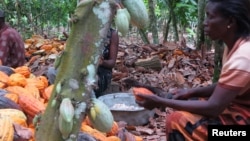ACCRA —
A U.S. law intended to encourage revenue transparency and accountability in resource-rich countries such as Ghana will take effect in 2014. The Dodd-Frank Wall Street Reform Act requires oil, gas and mining companies listed on U.S. stock exchanges to make full disclosures of payments made to governments in countries where they do business. The new law will allow Ghanaians, especially communities that suffer environmental costs on account of these industries, to fight for their rights.
The law covers more than 1,000 international companies including Anadarko, Hess, Kosmos and Tullow Oil - all of which operate in Ghana.
Rights monitoring groups say transparency is badly needed in Ghana. Boakye Dankwa Boadi is director of communications at WACAM, a non -profit organization engaged in environmental, human rights and mining advocacy. He says some cocoa farms were destroyed at Kenyase in the Brong Ahafo region of Ghana to make way for mining activities but the affected individuals are yet to be fully compensated.
“When they wanted to pay compensation for cocoa farms, they paid less than $10 for a cocoa tree," he explained. "Meanwhile at current prices a cocoa tree could yield about $5 a year. But they paid only $10 for a cocoa tree which will have a life span of over 40 years. So in essence they short changed the farmers”
Transparency advocates say the Dodd Frank law will allow communities to benefit more from oil and mineral extraction because all payments made by foreign companies to the government will be made public.
“When companies sign contracts to do explorations they often make upfront payments called signature bonuses," said Ian Gary, senior policy manager for Oxfam, USA. "Other type of payments are corporate taxes, the royalties that they pay for the projects, customs duties, they even have to disclose whether they have provided payment for infrastructure. For example, if a mining company builds a road, that payment has to be disclosed because of the law.
Ghana has a fair degree of transparency around its mining and oil revenues. The country passed the Revenue Management Act last year to ensure disclosures of government receipts from the oil and gas sectors. But Gary says the new U.S. law will help citizens, parliamentarians and journalists ensure that what companies say they are paying is what government is actually receiving.
“It is a layer of assurance to ensure that not only are numbers being disclosed but these are accurate and real numbers. For Ghana there is some degree of transparency at the national level but at the local level and the district assemblies, there is very little information about how these district assemblies get and use money,” Gary said.
He added that it is important for citizens to demand accountability and use the information that the new laws will make available.
Gary also noted that oil consuming countries in Europe need to pass similar legislation in order to promote transparency in resource rich countries. Currently, Britain , France and Germany have shown some support for a European Commission regulation in line with the new U.S. law.
The law covers more than 1,000 international companies including Anadarko, Hess, Kosmos and Tullow Oil - all of which operate in Ghana.
Rights monitoring groups say transparency is badly needed in Ghana. Boakye Dankwa Boadi is director of communications at WACAM, a non -profit organization engaged in environmental, human rights and mining advocacy. He says some cocoa farms were destroyed at Kenyase in the Brong Ahafo region of Ghana to make way for mining activities but the affected individuals are yet to be fully compensated.
“When they wanted to pay compensation for cocoa farms, they paid less than $10 for a cocoa tree," he explained. "Meanwhile at current prices a cocoa tree could yield about $5 a year. But they paid only $10 for a cocoa tree which will have a life span of over 40 years. So in essence they short changed the farmers”
Transparency advocates say the Dodd Frank law will allow communities to benefit more from oil and mineral extraction because all payments made by foreign companies to the government will be made public.
“When companies sign contracts to do explorations they often make upfront payments called signature bonuses," said Ian Gary, senior policy manager for Oxfam, USA. "Other type of payments are corporate taxes, the royalties that they pay for the projects, customs duties, they even have to disclose whether they have provided payment for infrastructure. For example, if a mining company builds a road, that payment has to be disclosed because of the law.
Ghana has a fair degree of transparency around its mining and oil revenues. The country passed the Revenue Management Act last year to ensure disclosures of government receipts from the oil and gas sectors. But Gary says the new U.S. law will help citizens, parliamentarians and journalists ensure that what companies say they are paying is what government is actually receiving.
“It is a layer of assurance to ensure that not only are numbers being disclosed but these are accurate and real numbers. For Ghana there is some degree of transparency at the national level but at the local level and the district assemblies, there is very little information about how these district assemblies get and use money,” Gary said.
He added that it is important for citizens to demand accountability and use the information that the new laws will make available.
Gary also noted that oil consuming countries in Europe need to pass similar legislation in order to promote transparency in resource rich countries. Currently, Britain , France and Germany have shown some support for a European Commission regulation in line with the new U.S. law.





